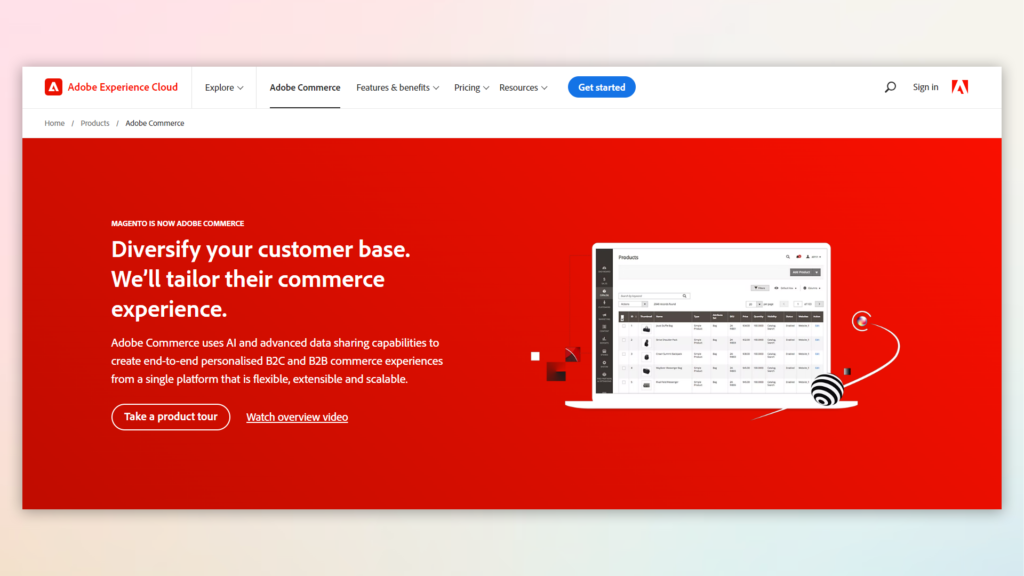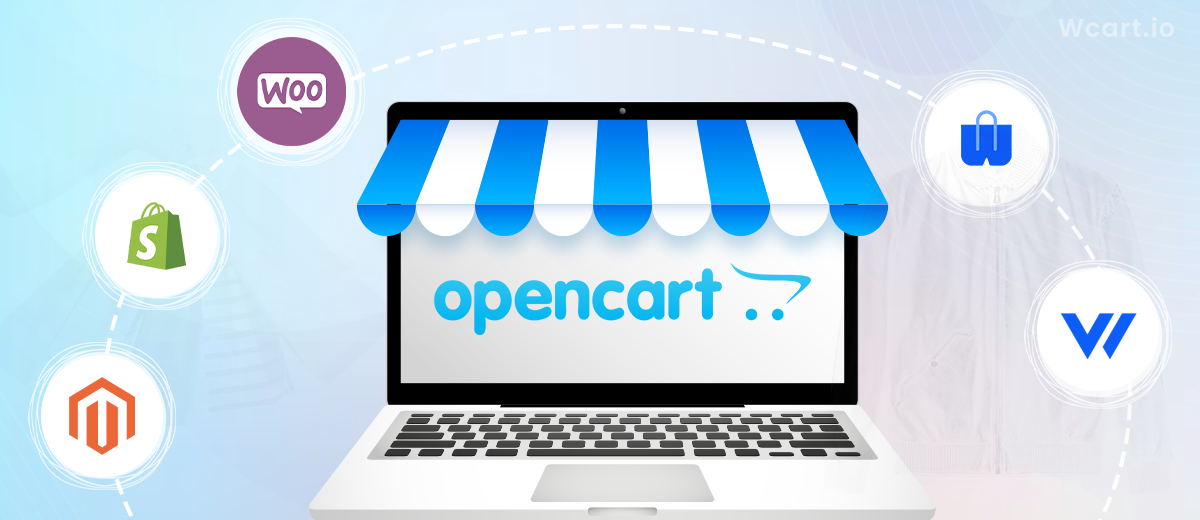Are you struggling with OpenCart’s limitations and searching for the best OpenCart alternatives in 2025? You’ve found the ultimate guide.
As online shopping evolves at lightning speed, many eCommerce businesses are finding OpenCart’s outdated structure, sluggish load times, and limited integrations costing them real money. What once worked in your store’s early days might now be hurting your performance, conversions, and ability to scale.
If you’re dealing with broken extensions, poor mobile optimization, or weak SEO tools these are clear warning signs that it’s time to explore OpenCart alternatives
The reality? Hundreds of successful store owners have already migrated from OpenCart to modern, growth-focused platforms like Wcart, Shopify, and Webnexs platforms built for scalability, flexibility, and long-term success in 2025.
Proof This Works: Stores that migrated from OpenCart in 2024 saw an average 40% revenue increase within 6 months of switching platforms.
Ready to discover which modern eCommerce platform will transform your business? Let’s explore the 5 best OpenCart alternatives that align with how today’s customers shop and how successful businesses grow.
Read More: To Know about Top Ecommerce Platforms
What is OpenCart?
OpenCart is a PHP-based open-source ecommerce platform popular for its no-cost license and basic ecommerce features. Many early-stage online stores choose it because it’s free to use, doesn’t demand monthly subscriptions, and can be set up quickly.
But as your operations grow, you may find yourself needing faster speed, smarter marketing tools, mobile optimization, and integrations that just aren’t available out of the box.
Why Users Are Switching from OpenCart
In 2025, growth-minded ecommerce teams are prioritizing performance, mobile-first design, marketing automation, and customer experience.
OpenCart’s limitations become apparent when:
- Your store becomes slow under high traffic or larger inventory
- You need integrations like email automation, headless frontend, or PWA
- Security updates are infrequent or lag behind
- You need developer support for every major customization
- There’s no built-in support for abandoned cart recovery, AI recommendations, or modern UX
The Growing Need for OpenCart Alternatives
In recent years, the ecommerce market has evolved rapidly, with businesses seeking more advanced and flexible solutions to meet their specific requirements.
Although OpenCart has been a successful platform for online shops, there is an increasing need to investigate alternatives that provide more functionality, faster performance, and better scalability.
Let’s explore the key reasons behind this increasing demand for OpenCart alternatives:
- Limited Scalability: As businesses grow and expand their operations, they require an ecommerce platform that can seamlessly accommodate their increasing product range, traffic, and customer base. OpenCart, although suitable for small to mid-sized businesses, may face limitations in handling large-scale operations.
- Customization Constraints: Every business has unique branding and design requirements. OpenCart’s customization options, while decent, may not offer the level of flexibility needed to create a truly tailored online store experience. Limited customization capabilities can hinder businesses from fully expressing their brand identity and achieving a distinct online presence.
- Integration Challenges: Successful ecommerce businesses rely on seamless integration with various third-party services, such as payment gateways, shipping providers, or marketing automation tools. OpenCart’s compatibility with certain integrations and extensions may be limited, restricting businesses from utilizing the full potential of their preferred services.
- User Experience and Interface: In today’s digital era, user experience plays a crucial role in capturing and retaining customers. OpenCart’s interface and user experience, while functional, may not offer the modern and intuitive design elements that customers have come to expect.
Finally, these alternatives to OpenCart offer a wide range of features, scalability, customization options, and integration capabilities that can help businesses thrive in the competitive ecommerce world.
In the following sections, we will introduce you to the top OpenCart alternatives that will exceed your expectations and empower your online business. Get ready to embark on a transformative journey!
What Are The Best OpenCart Alternatives For Your Ecommerce Business?
The best OpenCart alternatives for your ecommerce business are mentioned below: Wcart, Webnexs, Shopify, Magento, and Woocommerce for diverse solutions catering to your business needs. Each platform offers unique features to elevate your online store. Choose the one that aligns perfectly with your goals and preferences.
5 Best OpenCart Alternatives For Your Ecommerce Business
Let’s see the top ecommerce platforms for the Opencart alternatives one by one:
Wcart

Wcart is an ecommerce platform that operates in the cloud, providing businesses with the ability to effortlessly create and manage their online stores. This platform serves as a viable alternative to Opencart, offering enhanced flexibility and a wider range of customization options to cater to the unique needs of businesses. With Wcart, users can enjoy a seamless and user-friendly interface, enabling them to design and launch their online stores rapidly and efficiently.
Benefits of Wcart
Wcart, an excellent OpenCart alternative, provides businesses with a variety of benefits that enhance their online store experience. Let’s explore some of the advantages offered by Wcart:
- Extensive Customization Options
Wcart surpasses Opencart in terms of customization options, empowering businesses to create a truly unique and personalized online store. With Wcart, businesses can effortlessly tailor their website to reflect their brand identity and capture the attention of their target audience.
- 0% Transaction Fees
By choosing Wcart over Opencart, businesses can enjoy the advantage of lower transaction fees(directly paid to the payment gateway provider). This cost-saving feature ensures that businesses retain a larger portion of their earnings on every sale made through their online store.
- User-Friendly Interface
It boasts a user-friendly interface that simplifies the process of designing and launching an online store. Its intuitive tools and user-centric features make it easier for businesses to create a professional and visually appealing storefront without the need for extensive technical knowledge or coding skills.
- Affordable Pricing Plans
Wcart understands that businesses have diverse budgets and offers a range of pricing plans to accommodate their needs. Whether you’re a small startup or an established enterprise, Wcart provides flexible and affordable options that ensure you get the most value for your investment.
- Multi-Currency Support
It goes the extra mile by offering multi-currency support, enabling businesses to sell their products or services globally. This feature is particularly advantageous for businesses targeting international markets, as it simplifies the purchasing process for customers and enhances the overall user experience.
In summary, Wcart emerges as a top-notch OpenCart alternative, offering an array of customization options, lower transaction fees, a user-friendly interface, affordable pricing plans, and multi-currency support. By choosing Wcart, businesses can elevate their online presence, improve customer satisfaction, and drive greater revenue.
Webnexs

Webnexs is an ecommerce platform that provides businesses with a comprehensive set of tools and features to establish and operate their online stores successfully. With Webnexs, businesses have the capability to design and customize their storefronts, efficiently manage products and inventory, seamlessly process payments, and gain insights into sales and customer data. Additionally, the platform offers a wide array of marketing and SEO tools that empower businesses to drive targeted traffic and boost their sales.
Benefits of Webnexs
When it comes to online store management, Webnexs stands out with its impressive features and user-friendly interface. Let’s take a closer look at what makes Webnexs a top choice for businesses:
- User-friendly interface: It prioritizes ease of use with its intuitive interface, ensuring that businesses can navigate through the platform effortlessly. Setting up and managing online stores becomes a hassle-free experience, even for those without extensive technical expertise.
- Comprehensive feature set: With Webnexs, businesses have access to a wide range of features that empower them to create and manage their online stores efficiently. From robust product management tools to seamless payment processing, Webnexs covers all the essential aspects of running an e-commerce business.
- Multi-channel selling: This Platform understands the importance of expanding its reach and driving sales through various channels. With Webnexs, businesses can effortlessly sell their products not only on their standalone online store but also on popular marketplaces and social media platforms. This multi-channel approach helps businesses tap into larger customer bases, boosting their visibility and sales potential.
- Responsive design: In today’s mobile-driven world, having a mobile-friendly online store is crucial. Webnexs addresses this need by providing responsive design templates that adapt to different screen sizes and devices. This ensures that businesses can effectively reach and engage customers, regardless of whether they are browsing on desktops, smartphones, or tablets.
Finally, Webnexs offers an exceptional user experience with its user-friendly interface and comprehensive set of features. With multi-channel selling capabilities and responsive design templates, businesses can elevate their online presence, expand their customer base, and drive higher sales. Whether you’re starting a new online store or looking to migrate from OpenCart, Webnexs provides a powerful alternative that delivers on both functionality and user satisfaction.
Shopify

Shopify, a leading all-in-one e-commerce platform, empowers users to effortlessly create and manage their online stores. With its extensive range of features, customizable templates, and themes, businesses can tailor their online presence to align with their unique branding and design preferences.
One of the standout features of Shopify is its built-in payment gateway, which simplifies the payment process for both businesses and customers. With secure and reliable payment options, businesses can provide a seamless checkout experience, increasing customer trust and satisfaction.
Benefits of Shopify
The benefits of using Shopify as an e-commerce platform are numerous and can greatly contribute to the success of businesses. Here are some key benefits of Shopify:
- Easy to Use: It is renowned for its user-friendly interface, making it accessible to users with varying levels of technical expertise. Setting up an online store, adding products, managing inventory, and processing orders can be done with ease, even for beginners.
- All-in-One Solution: This Platform provides a comprehensive suite of tools and features that cover all aspects of running an online store. From customizable themes and templates to built-in payment gateways, shipping tools, and marketing features, Shopify offers a seamless and integrated solution for businesses.
- App Store and Integrations: Its extensive app store allows businesses to enhance their online stores with additional functionalities. From marketing and analytics tools to customer support and inventory management apps, businesses can tailor their Shopify experience to their specific needs.
- SEO-Friendly: This is designed with search engine optimization (SEO) best practices in mind. It provides the necessary tools and features to optimize website content, meta tags, URLs, and other elements, helping businesses improve their visibility and organic search rankings.
Overall, Shopify’s benefits lie in its simplicity, versatility, scalability, and comprehensive feature set, making it an ideal choice for businesses of all sizes seeking to establish and grow their online presence.
Read More: To Know about Shopify Alternatives
Magento

Being a widely used open-source ecommerce platform, Magento empowers businesses with an extensive array of tools and features to efficiently create and manage their online stores. Its initial release in 2008 marked the beginning of a remarkable journey, propelling Magento to its current status as one of the most sought-after ecommerce platforms available. The platform owes its success to its vibrant community of developers and users who actively contribute to its ongoing development, ensuring its continuous improvement and relevance in the ever-evolving ecommerce landscape.
Benefits of Magento
Magento offers a multitude of benefits that make it a preferred choice for businesses looking to establish a robust online presence. Here are some of the key advantages of using Magento:
- Flexible and Scalable: It provides businesses with a highly flexible and scalable platform, capable of accommodating the evolving needs of small startups to large enterprises. Whether you have a small product catalog or thousands of SKUs, Magento can scale to support your business growth.
- Extensive Feature Set: With its extensive feature set, Magento equips businesses with a wide range of tools to manage their online stores effectively. From product management and inventory control to advanced marketing and promotional capabilities, Magento offers comprehensive features that support the entire ecommerce workflow.
- Robust Security: Security is a top priority for any ecommerce business. Magento prioritizes security by regularly releasing updates and security patches to address vulnerabilities. Additionally, it offers features like secure payment gateways, SSL support, and data encryption to protect sensitive customer information.
- Integration Capabilities: It integrates smoothly with various third-party services, including payment gateways, shipping providers, ERP systems, and CRM software. This allows businesses to streamline their operations and leverage existing tools to enhance efficiency and productivity.
- Active Community and Support: This Platform boasts a vibrant community of developers and users who actively contribute to its growth. The community provides extensive documentation, forums, and resources, offering valuable insights and support to help businesses make the most of the platform.
Overall, these benefits collectively position Magento as a powerful ecommerce solution, empowering businesses to create engaging online stores, drive sales, and deliver exceptional customer experiences.
Read More: To Know about Magento Alternatives
Woocommerce

WooCommerce, a widely used platform for small to medium-sized businesses, is an open-source ecommerce plugin designed specifically for WordPress websites. It provides a powerful and flexible solution for businesses seeking to establish their online stores.
As an open-source plugin, WooCommerce offers businesses the freedom and flexibility to customize and tailor their online stores according to their unique requirements. Hence, it seamlessly integrates with WordPress, one of the most popular content management systems, leveraging its robust features and extensive community support.
With its user-friendly interface and intuitive setup process, WooCommerce simplifies the process of creating an online store. Businesses can easily manage product listings, inventory, and customer orders, ensuring a seamless shopping experience for their customers. The platform also provides a wide range of themes and design options to create visually appealing and engaging online stores that align with the business’s branding and style.
Benefits of Woocommerce
WooCommerce offers several benefits for businesses looking for an e-commerce solution:
- Easy Integration: It seamlessly integrates with WordPress, allowing businesses to leverage the power of both platforms and manage their online store and website in one place.
- Cost-effective: This is a free and open-source e-commerce plugin. This makes it a cost-effective option for businesses, as they can set up and run their online store without incurring additional software expenses.
- Customizability: With a wide range of design templates and third-party extensions available, WooCommerce provides businesses with the flexibility to customize their online store according to their branding and unique requirements. Therefore, this allows for a tailored and professional look and feel.
- Scalability: It is highly scalable and can accommodate the growth of businesses of all sizes. So, it can handle a growing product inventory, increased website traffic, and evolving customer demands.
- Active Community and Support: With a large and active user community, WooCommerce benefits from ongoing development, updates, and support. Businesses can rely on a wealth of resources, forums, and documentation to seek assistance and stay up-to-date with the latest trends and features.
Finally, WooCommerce offers easy integration with WordPress, cost-effectiveness, customization options, scalability, an extensive plugin library, and a supportive user community. Therefore, these benefits make WooCommerce a popular choice for businesses seeking a robust and adaptable e-commerce solution.
Read More: To Know about Woocommerce Alternatives
Migration Strategy: How to Switch Opencart Without Losing Sales
The 7-Step Migration Process
Step 1: Pre-Migration Analysis
- Audit current store performance
- Document custom features
- Backup all data
- Plan SEO preservation strategy
Step 2: Platform Setup
- Configure new platform like Wcart
- Install necessary apps/extensions
- Set up payment gateways
- Configure shipping options
Step 3: Design & Customization
- Implement design
- Customize checkout process
- Set up product pages
- Configure mobile optimization
Step 4: Data Migration
- Import products and categories
- Migrate customer data
- Transfer order history
- Set up redirects
Step 5: Testing Phase
- Test all functionality
- Check mobile responsiveness
- Verify payment processing
- Test checkout flow
Step 6: SEO Preservation
- Implement 301 redirects
- Submit updated sitemap
- Monitor search rankings
- Update Google My Business
Step 7: Go Live & Monitor
- Launch new store
- Monitor performance
- Track conversion rates
- Gather customer feedback
Final Thought about OpenCart Alternatives
OpenCart served its purpose in the early days of ecommerce, but 2025 demands faster, smarter,and offer user-friendly interfaces platforms. Among the Opencart alternatives we’ve covered, Wcart stands out as the top choice for businesses migrating from OpenCart, offering 0% transaction fees, drag-and-drop customization, and lightning-fast performance.
While Shopify, Webnexs, Magento, and WooCommerce each have their strengths, Wcart specifically addresses OpenCart’s core limitations with modern solutions built for today’s ecommerce landscape.
Migration doesn’t have to be complicated. With Wcart’s seamless migration tools and proven process, you can boost performance, improve conversions, and scale your business effectively.
Start Your Free Trial Begin your migration journey with a free 14-day trial of Wcart experience 0% transaction fees, lightning-fast performance, and see why it’s the #1 choice for businesses leaving OpenCart.
Frequently Asked Questions(FAQs)
What are some popular alternatives to OpenCart for building ecommerce websites?
OpenCart is a widely used ecommerce platform, but there are several alternatives available. Some popular alternatives to OpenCart i.e., Wcart, Webnexs, Shopify, and PrestaShop.
How does WooCommerce compare alternative to OpenCart?
WooCommerce is a powerful ecommerce plugin for WordPress, offering seamless integration with the WordPress platform. Hence provides a user-friendly interface, extensive customization options, and a large library of plugins and themes. While OpenCart is a standalone platform, WooCommerce offers more flexibility and scalability for businesses already using WordPress.
Is Shopify a suitable alternative to OpenCart for beginners?
Yes, Shopify is an excellent alternative for beginners looking to set up an online store without extensive technical knowledge. It is a fully hosted platform, which means you don’t need to worry about server management or software updates.
What advantages does Magento offer as an alternative to OpenCart?
Magento is a robust and highly customizable ecommerce platform suitable for businesses with complex needs. It provides advanced features, scalability, and flexibility. Compared to OpenCart, Magento offers more extensive options for managing large product catalogs, multiple storefronts, and complex e-commerce workflows. However, Magento requires more technical expertise to set up and maintain.
How does BigCommerce compare to OpenCart as an alternative?
BigCommerce is a fully hosted ecommerce platform that offers a comprehensive set of features for building and scaling online stores. Specifically, it provides a user-friendly interface, mobile-responsive themes, and built-in marketing tools. Compared to OpenCart, BigCommerce offers more out-of-the-box functionality and support for larger businesses. It also provides excellent performance and security features.




Leave a Reply